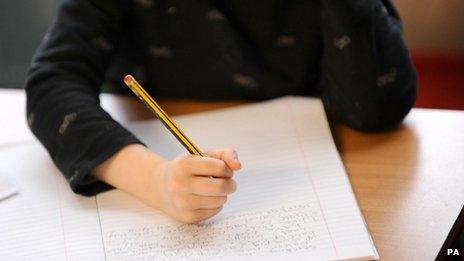State school fees call for parents earning over £80,000
- Published

Dr Anthony Seldon said the more parents earn, the more they should pay
Parents who earn a combined income of more than £80,000 should have to pay if their children go to the most popular state schools, a report suggests.
Private headmaster Dr Anthony Seldon raises the idea for left of centre think tank, the Social Market Foundation.
He said it would break "the middle-class stranglehold on top state schools" and provide additional funds.
Education Secretary Michael Gove said the Tories would not adopt the policy.
Education is devolved in Scotland, Wales and Northern Ireland.
Spokeswomen for the Scottish government and the Welsh government said there were no plans to look at introducing any policies under which parents would pay for their children to attend schools.
'Unfair farce'
In the report, external, Dr Seldon, who is head of the private school Wellington College, argues a "new wave" of radical education reform is needed to end the educational divide between state and independent schools and boost social mobility.

Dr Seldon is headmaster at Wellington College
Families earning more than £200,000 per year should pay the full price of their children's education at popular state schools, the report - titled Schools United: Ending the Divide Between Independent and State - said.
Dr Seldon said parents who were the top earners would pay the fee the state pays, which would be about £6,000.
Fees at the most oversubscribed state schools could be the same for the most affluent as those at independent day schools, about £15,000 a year for some primary schools, and £20,000 at secondary schools.
He said a quarter of the money raised through charging should be retained by the school, with the rest redistributed among other state schools.
The report also urges that:
State schools emulate the best features of independent schools such as house systems, boarding, longer school days, uniforms and greater parental involvement
Independent schools should bond with state schools, from shared teaching and facilities to sponsoring an academy or setting up a free school
Independent schools should open their doors and offer a quarter of their places to those from the least affluent quartile in the country
Speaking to BBC News, Dr Seldon said: "There's a tremendously unjust system at the moment whereby the rich and the successful and those with strong elbows buy houses in catchment areas of successful schools; they pay for tutoring, they elbow their way into top schools and this pamphlet is designed to enhance social justice.
"We need the money in the state schools and this will produce it."
'Great bastion'
The report says "far reaching reforms" in the state education system - introduced since 2000 by Labour's Lord Adonis and continued by his coalition successor Education Secretary Michael Gove - have led to improved standards and should be completed.
The proposal to offer poorer pupils places at independent schools says their fees should be paid by a government grant capped 50% above the cost of sending them to a state school.
Dr Seldon added the UK would be "in debt for many years to come" and that state schooling was "the last great bastion holding out against the principle of payment".
In December, the head of education watchdog Ofsted warned of differences in pupil attainment across the country. Chief inspector of schools Sir Michael Wilshaw said the gap was like "two nations".
In separate comments, Sir Michael said that grammar schools were "stuffed full" of middle-class children and did not improve social mobility.
Research, meanwhile, has suggested that about one in three professional parents in England has moved to an area he or she considers to have good schools.
- Published11 December 2013
- Published15 December 2013
- Published18 December 2013